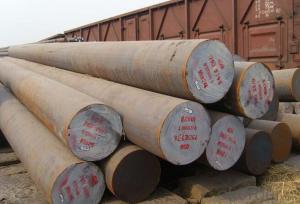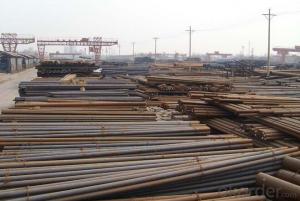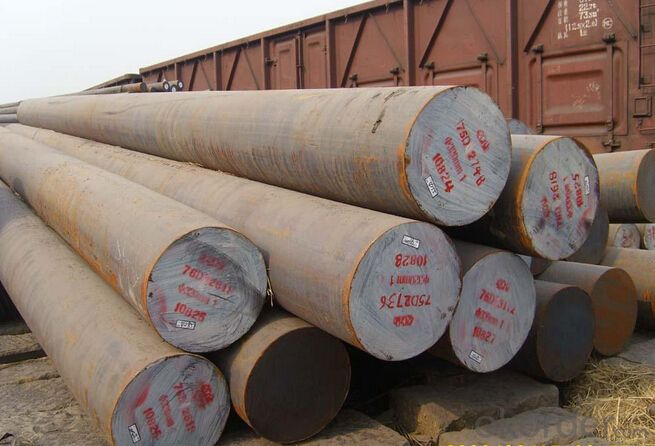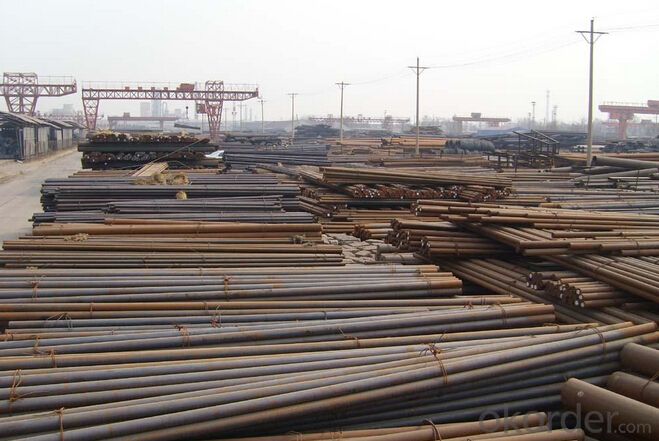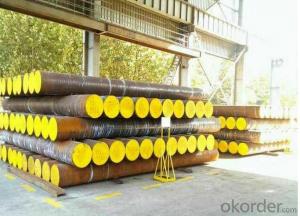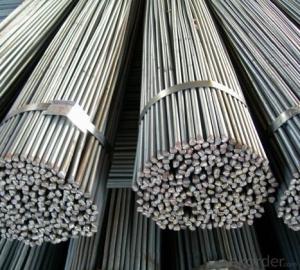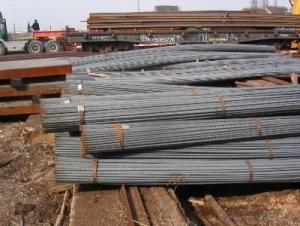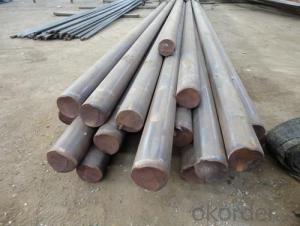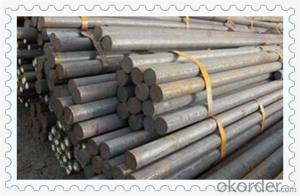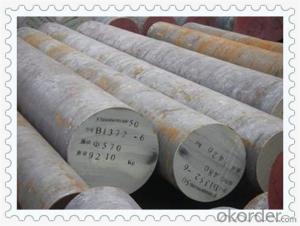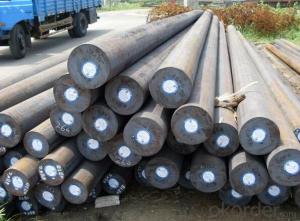Hot Work Die Steel Round Bar H12 Steel
- Loading Port:
- China main port
- Payment Terms:
- TT OR LC
- Min Order Qty:
- 25 m.t.
- Supply Capability:
- 10000 m.t./month
OKorder Service Pledge
OKorder Financial Service
You Might Also Like
Specification
The details of our Steel
1. Produce Standard: as the GB, AISI, ASTM, SAE, EN, BS, DIN, JIS Industry Standard
2. Produce processes: Smelt Iron -EAF smelt Billet - ESR smelt Billet -Hot rolled or forged get the steel round bar and plate
3. Heat treatment:
Normalized / Annealed / Quenched+Tempered
4. Quality assurance:
All order we can received Third party inspection, You can let SGS, BV,.. and others test company test and inspect our products before Goods shipping.
Product information
1.Specification of H12 steel | |||||||||||||
Round bar | Diameter(mm) | Length (mm) | |||||||||||
70~600 | 2000~6000 | ||||||||||||
Plate | Thickness(mm) | Width (mm) | Length (mm) | ||||||||||
25~400 | 100~810 | 2000~5800 | |||||||||||
The specification can be customised! | |||||||||||||
2.Chemical compositon of H12 steel | |||||||||||||
NO. | C | Mn | Si | Cr | Mo | V | P | S | |||||
Aisi H12 | 0.28~0.55 | 0.15~0.45 | 0.10~0.40 | 2.70~3.20 | 2.60~3.00 | 0.40~0.70 | ≤0.030 | ≤0.030 | |||||
3.Delivery condition | |||||||||||||
Standard Number | Annealing | Heat treatment temp( °C ) | HRC Secondar Hardness | ||||||||||
H12 | ≤235 | Hardening: 1020 Tempering: 530~560 | 47~54 | ||||||||||
4.Heat treatment | |||||||||||||
1.Quench:1000-1040`C via 600`C and 850`C, preheating oil or wind cooling 2.Temper temperature should be higher than working temperature in order to stabilize the working size of mold 3.Heat up to 650°C of average temperature in order to eliminate the machined stress, 500 °c air cooling after electric cooker cooling 4.Tempering, 800-850 °c ,slow cooling after diathermia 5. Melting Process of SKD61 steel rod | |||||||||||||
1.EAF: Electric Furnace+LF+VD(Optional) | |||||||||||||
2.ESR: Electric Furnace+LF+VD+Eleroslag Remelted(Optional) | |||||||||||||
UT Class of SKD61 steel rod | |||||||||||||
5.Characteristic of H12steel | |||||||||||||
(1) High strength toughness, high chromium steel | |||||||||||||
(2) Good hot intensity and rigidity. | |||||||||||||
(3) Good tenacity, hot tirdness nature and wearable in medium temperature | |||||||||||||
(4) Empty quench in low Austenitizing temperature condition, little distortion after heat treatment. | |||||||||||||
6.Application | |||||||||||||
(1) Used in hard plastic mold , aluminum, zinc alloy die-casting mold , forging hammer. | |||||||||||||
(2) high speed precision forging die insertsdrawing dies, plate dies and edge or cold shears,etc. | |||||||||||||
(3) All products' technology request and dimensions | |||||||||||||
Product show

Workshop show

Shipping
1. FedEx/DHL/UPS/TNT for samples, Door-to-Door;
2. By Air or by Sea for batch goods, for FCL; Airport/ Port receiving;
3. Customers specifying freight forwarders or negotiable shipping methods!
Delivery Time: 3-7 days for samples; 5-25 days for batch goods.
Payment Terms
1.Payment: T/T, L/C, Western Union, MoneyGram,PayPal; 30% deposits; 70% balance before delivery.
2.MOQ: 1pcs
3.Warranty : 3 years
4.Package Informations: 1) EXPORT, In 20 feet (GW 25 ton) or 40 feet Container (GW 25 ton)
2)as customer's requirement
Why choose us?
(1) The leading exporter in China special steel industry.
(2) Large stocks for various sizes, fast delivery date.
(3) Good business relationship with China famous factories.
(4) More than 7 years steel exporting experience.
(5) Good after-sales service guarantee.
- Q: How is precipitation-hardening steel used in aerospace applications?
- Precipitation-hardening steel is widely used in aerospace applications due to its exceptional strength-to-weight ratio and resistance to corrosion. This type of steel is heat-treated to create a fine dispersion of precipitates, which significantly enhances its mechanical properties. In aerospace, it is commonly used for manufacturing critical components such as landing gear, structural frames, and engine parts. These materials provide the necessary strength and durability required to withstand the demanding conditions of flight while reducing weight to improve fuel efficiency and overall performance.
- Q: How does special steel resist oxidation at high temperatures?
- Special steel resists oxidation at high temperatures due to the presence of alloying elements such as chromium, aluminum, and silicon. These elements form a protective layer of oxides on the surface of the steel, which acts as a barrier against further oxidation. This layer is stable even at high temperatures, preventing the steel from reacting with oxygen in the environment and thus maintaining its structural integrity.
- Q: How does special steel contribute to the electronics industry?
- Special steel contributes to the electronics industry by providing crucial components and materials that enhance the performance, durability, and efficiency of electronic devices. It is commonly used in the production of circuit boards, connectors, and various electronic components due to its excellent conductivity, heat resistance, and corrosion resistance properties. Additionally, special steel is utilized in the manufacturing of precision tools and equipment used in the production and assembly of electronic devices. Overall, special steel plays a vital role in ensuring the reliability and functionality of electronics, enabling advancements in technology and innovation within the industry.
- Q: How does special steel contribute to the construction sector?
- The construction sector heavily relies on special steel for its ability to enhance the quality, durability, and safety of structures. This type of steel is known for its exceptional strength and toughness, making it an ideal choice for high-rise buildings, bridges, and other infrastructure projects. Its high tensile strength allows for the construction of lighter and more slender structures, reducing material costs and allowing architects to design innovative and visually pleasing buildings. Additionally, special steel boasts high resistance to corrosion, which is particularly crucial in construction projects located in harsh environments such as coastal areas or industrial zones. This resistance ensures that structures built with special steel have a longer lifespan and require less maintenance, resulting in significant cost savings over time. Furthermore, its ability to withstand fire and extreme temperatures makes it indispensable for fire-resistant structures and critical components, guaranteeing the safety of occupants. Furthermore, special steel offers excellent ductility and weldability, allowing it to seamlessly integrate with other construction materials and facilitate efficient assembly processes. Its versatility makes it suitable for various structural elements like beams, columns, and reinforcement bars, providing stability and structural integrity to buildings, as well as improving their seismic performance. Moreover, the use of special steel in construction aligns with sustainability goals. It is a recyclable material that can be reused without compromising its properties, reducing the environmental impact of the construction sector. Additionally, its lighter weight compared to traditional materials minimizes the carbon footprint associated with transportation and installation. In conclusion, special steel significantly contributes to the construction sector by providing strength, durability, fire resistance, corrosion resistance, and versatility. Its use enables the construction of safer, more cost-effective, and environmentally-friendly structures, enhancing the overall quality and sustainability of the built environment.
- Q: How is tool and die steel used in the manufacturing of molds and dies?
- Tool and die steel is used in the manufacturing of molds and dies because of its high hardness, wear resistance, and toughness properties. It is used to create and shape various components of molds and dies, such as inserts, cavities, and cores, which are crucial in the production of plastic, metal, or other materials. Additionally, tool and die steel also provides the necessary strength and durability to withstand the high pressure, heat, and repeated use involved in the manufacturing process.
- Q: Can special steel be used for tooling applications?
- Yes, special steel can be used for tooling applications. Special steel alloys possess unique properties such as high strength, wear resistance, toughness, and heat resistance, making them suitable for tool manufacturing in various industries such as automotive, aerospace, and manufacturing. These tooling applications include molds, dies, cutting tools, and precision instruments, where the use of special steel ensures the durability and performance required for demanding operations.
- Q: How is special steel used in the defense supply chain?
- Special steel is used in the defense supply chain for a variety of applications. It is utilized in the manufacturing of military vehicles, aircraft, and naval vessels, providing strength, durability, and resistance to extreme conditions. Special steel is also crucial in the production of weapons and ammunition, ensuring the reliability and effectiveness of these defense systems. Additionally, it plays a vital role in the construction of military infrastructure and equipment, such as bridges, barriers, and armor plating, enhancing their ability to withstand impact, blasts, and other threats.
- Q: What are the requirements for special steel used in high-temperature applications?
- To ensure optimal performance and durability in extreme conditions, special steel utilized in high-temperature applications, such as aerospace, power generation, and oil and gas industries, must fulfill specific criteria. Some essential requirements for this type of steel include: 1. Excellent strength and resistance to deformation at elevated temperatures are vital for maintaining structural integrity and preventing failure or deformation under extreme heat. 2. High resistance to oxidation is necessary to prevent the formation of oxides on the steel's surface, which can weaken its structure and compromise its performance. 3. Exceptional creep resistance is essential to prevent excessive deformation or failure over time caused by constant stress at high temperatures. 4. Good thermal stability allows the steel to retain its mechanical properties even after prolonged exposure to high temperatures, ensuring reliable and consistent performance. 5. In addition to oxidation, the steel must also possess good corrosion resistance to protect against various corrosive agents present in the environment, such as acids, alkalis, and salts. 6. High resistance to thermal fatigue is crucial to prevent cracking, fracturing, or failure due to repeated heating and cooling cycles. 7. Low thermal expansion minimizes dimensional changes and maintains dimensional stability under high-temperature conditions, preventing unwanted distortions or misalignments. 8. Good weldability facilitates the fabrication and joining of components, enabling the construction of complex structures and assemblies required in high-temperature environments. By meeting these requirements, special steel used in high-temperature applications can withstand extreme heat, preserve its structural integrity, and deliver reliable performance in demanding conditions.
- Q: What are the challenges in heat treating special steel?
- One of the challenges in heat treating special steel is achieving the desired hardness and strength while maintaining dimensional stability. Special steels often have complex alloy compositions that require precise heat treatment processes to achieve the desired properties. Another challenge is controlling the transformation temperatures and rates, as special steels may have multiple phase transformations that need to be precisely controlled to avoid distortion or cracking. Additionally, special steels may have high hardenability, making it difficult to achieve uniform hardness throughout the part. Overall, heat treating special steel requires a deep understanding of its composition and careful control of the heat treatment parameters to overcome these challenges and achieve the desired properties.
- Q: How does special steel perform in corrosion fatigue conditions?
- Special steel performs well in corrosion fatigue conditions due to its high resistance to corrosion and fatigue. It is specifically designed to withstand harsh environments and prolonged exposure to corrosive elements. Special steel undergoes various treatments and alloying processes to enhance its corrosion resistance and mechanical properties. This allows it to maintain its structural integrity and performance even under corrosive and fatigue-inducing conditions.
Send your message to us
Hot Work Die Steel Round Bar H12 Steel
- Loading Port:
- China main port
- Payment Terms:
- TT OR LC
- Min Order Qty:
- 25 m.t.
- Supply Capability:
- 10000 m.t./month
OKorder Service Pledge
OKorder Financial Service
Similar products
Hot products
Hot Searches
Related keywords
